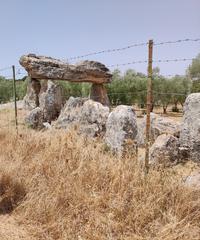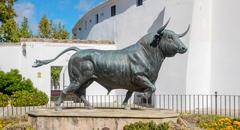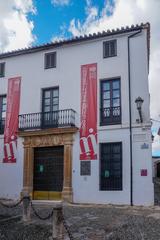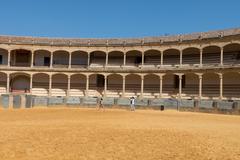Garden of the Moorish King’s House, Ronda, Spain: Visiting Hours, Tickets, and Historical Sites Guide
Date: 03/07/2025
Introduction
Perched high above the El Tajo gorge in the historic city of Ronda, Spain, the Garden of the Moorish King’s House (La Casa del Rey Moro) is an architectural and horticultural treasure. Renowned for its dramatic setting, Nasrid-era water mine, and early 20th-century terraced gardens, the site draws visitors eager to immerse themselves in Andalusia’s multicultural past. This guide provides comprehensive details on visiting hours, ticketing, accessibility, nearby attractions, and the site’s historical and cultural significance, enabling you to enjoy one of Ronda’s most iconic landmarks to the fullest (Nomads Travel Guide; What’s Down That Street; Guía de Ronda).
Table of Contents
- Introduction
- Historical Context and Evolution
- Architectural and Cultural Highlights
- Visitor Information
- Nearby Attractions
- Preservation and Events
- Frequently Asked Questions (FAQ)
- Visual and Digital Resources
- Summary and Recommendations
- References
Historical Context and Evolution
Moorish Legacy and Christian Transformation
While the current house structure dates from the 18th century and was never a royal Moorish residence, the site’s significance stems from its Nasrid-period engineering. Ronda was a crucial stronghold of the Nasrid Kingdom of Granada in the 13th and 14th centuries, valued for its dramatic cliffs and strategic position. The water mine—an ingenious 14th-century system carved deep into the rock—was vital for ensuring access to the Guadalevín River during sieges. According to legend and historical sources, Christian slaves labored to carry water up the mine’s steep steps during times of conflict (Nomads Travel Guide; What’s Down That Street).
In 1485, during the Christian reconquest, the water mine was instrumental in Ronda’s fall, as Christian troops used it to breach the city’s defenses. After the conquest, the site’s military importance waned, and its function shifted to reflect the evolving city (Nomads Travel Guide).
The Water Mine and Defensive Engineering
The water mine remains the most authentic Moorish feature at the site. With over 200 narrow, stone steps descending through vaulted passages to the river below, it is a testament to Nasrid hydraulic ingenuity and defensive needs. This subterranean feat allowed the city to withstand prolonged sieges and is one of the best-preserved examples of such engineering in Andalusia (What’s Down That Street).
The Gardens: Forestier’s Design
In the early 20th century, renowned French landscape architect Jean Claude Nicolas Forestier transformed the site with a series of terraced gardens. Combining French geometric order with Hispano-Muslim water features and Mediterranean flora, the gardens create a harmonious balance between architectural elegance and the wild Andalusian landscape. Forestier’s work here echoes his celebrated designs in Seville’s Parque María Luisa (Guía de Ronda).
Architectural and Cultural Highlights
The Gardens
Forestier’s gardens cascade down three terraces, featuring geometric parterres, shaded walkways, fountains, and vibrant plantings—including orange trees and the endemic Spanish fir. These terraces offer some of the best panoramic views of the El Tajo gorge, the Puente Nuevo bridge, and the surrounding Serranía de Ronda mountains (Guía de Ronda).
The Water Mine
Accessible from the gardens, the water mine descends over 200 steps through a narrow, vaulted passage cut into the cliff. Occasional openings provide light and glimpses of the gorge. At the base, visitors are rewarded with a unique river-level perspective of the canyon’s towering cliffs and the Puente Nuevo in the distance (What’s Down That Street).
Visitor Information
Opening Hours & Ticket Prices
- Opening Hours: Daily, typically 10:00 AM – 9:30 PM (May–September) and 10:00 AM – 8:00 PM (October–April).
- Ticket Prices: Adults €6–€9; discounts for students, seniors, and children. Combined tickets with other Ronda sites are sometimes available (Hotel Molino del Arco).
- Where to Buy: On-site at the entrance or via the official tourism website.
Accessibility
- The gardens are partially accessible but include steps and uneven surfaces.
- The water mine involves a steep, narrow descent and is not suitable for visitors with mobility challenges or young children.
- Comfortable footwear and caution are recommended.
Guided Tours
- Licensed local guides offer tours in Spanish and English, often including other Ronda historical attractions.
- Tours provide insight into the site’s history, architecture, legends, and hidden features.
- Check availability and schedules on the official website or at the entrance.
Practical Tips
- Best Time to Visit: Early morning or late afternoon for softer light and fewer crowds.
- Duration: Plan 1–2 hours for a thorough visit.
- What to Bring: Sturdy shoes, water, sun protection, and a camera.
- Safety: Steps in the mine may be slippery; use handrails.
Getting There
- Casa del Rey Moro is located at Calle Cuesta de Santo Domingo, 9, a short walk from Ronda’s old town and the Puente Nuevo.
- Public parking is available near the city center; Ronda is best explored on foot due to its compact size.
Nearby Attractions
- Puente Nuevo: Ronda’s iconic bridge spanning the El Tajo gorge (~400 m away).
- Mondragón Palace: 14th-century palace and municipal museum (~600 m).
- Arab Baths: Well-preserved 13th–14th-century baths (~800 m).
- Ronda Bullring: One of Spain’s oldest, with a museum (~1 km).
- Jardines de Cuenca: Terraced gardens with canyon views (~700 m).
- Casa Museo Don Bosco: Modernist mansion and gardens (~500 m).
- Plaza del Socorro: Main square with shops and cafes (~1.2 km).
- La Ciudad (Old Town): Moorish quarter with cobbled streets and whitewashed houses.
Preservation and Events
Casa del Rey Moro is protected as part of Ronda’s historic heritage. Ongoing maintenance preserves the gardens and water mine. The site occasionally hosts cultural events—such as open-air concerts and art exhibitions—especially during local festivals. Consult the official website or local listings for event schedules.
Frequently Asked Questions (FAQ)
Q: What are the Garden of the Moorish King’s House visiting hours?
A: Typically 10:00 AM – 9:30 PM (summer), 10:00 AM – 8:00 PM (winter); check official sources for updates.
Q: How much do tickets cost?
A: Adults €6–€9; discounts for students, seniors, and children.
Q: Is the water mine open to visitors?
A: Yes, but the descent is challenging—over 200 steep steps.
Q: Are guided tours available?
A: Yes, in Spanish and English; verify at the entrance or online.
Q: Is the site accessible for people with limited mobility?
A: The gardens are partially accessible; the water mine is not recommended for visitors with mobility restrictions.
Q: What other sites are nearby?
A: Puente Nuevo, Mondragón Palace, Arab Baths, Ronda Bullring, and several gardens and museums.
Visual and Digital Resources
- Images: Panoramic views of the gardens and gorge, water mine staircases, and the Puente Nuevo bridge.
- Virtual Tours: Available on the official tourism website.
- Alt Text Suggestions: “Casa del Rey Moro terraced gardens overlooking El Tajo gorge,” “Stone steps of the Water Mine in Ronda,” “View of Puente Nuevo from the river level.”
Summary and Recommendations
The Garden of the Moorish King’s House encapsulates Ronda’s unique blend of Nasrid engineering, romantic gardens, and dramatic natural scenery. Planning your visit with attention to opening hours, ticketing, and accessibility ensures a rewarding experience. Enhance your trip with guided tours and by exploring neighboring sites like Puente Nuevo, Mondragón Palace, and the Arab Baths.
For current visitor information, event listings, and ticket purchases, consult the official tourism website. For audio guides and travel tips, consider downloading the Audiala app or following related travel resources.
References and External Links
- Nomads Travel Guide - Casa del Rey Moro
- What’s Down That Street - Ronda Travel Guide
- Guía de Ronda - Ronda Guided Tour
- Hotel Molino del Arco - Casa del Rey Moro overview
- Official Ronda Tourism Website



